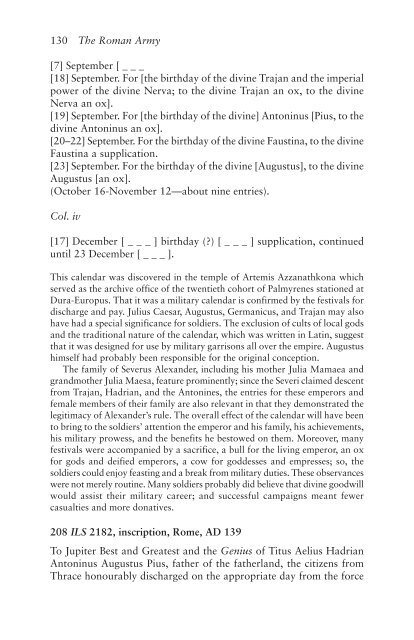The Roman Army, 31 BC–AD 337: A Sourcebook
The Roman Army, 31 BC–AD 337: A Sourcebook
The Roman Army, 31 BC–AD 337: A Sourcebook
Create successful ePaper yourself
Turn your PDF publications into a flip-book with our unique Google optimized e-Paper software.
130 <strong>The</strong> <strong>Roman</strong> <strong>Army</strong><br />
[7] September [ _ _ _<br />
[18] September. For [the birthday of the divine Trajan and the imperial<br />
power of the divine Nerva; to the divine Trajan an ox, to the divine<br />
Nerva an ox].<br />
[19] September. For [the birthday of the divine] Antoninus [Pius, to the<br />
divine Antoninus an ox].<br />
[20–22] September. For the birthday of the divine Faustina, to the divine<br />
Faustina a supplication.<br />
[23] September. For the birthday of the divine [Augustus], to the divine<br />
Augustus [an ox].<br />
(October 16-November 12—about nine entries).<br />
Col. iv<br />
[17] December [ _ _ _ ] birthday (?) [ _ _ _ ] supplication, continued<br />
until 23 December [ _ _ _ ].<br />
This calendar was discovered in the temple of Artemis Azzanathkona which<br />
served as the archive office of the twentieth cohort of Palmyrenes stationed at<br />
Dura-Europus. That it was a military calendar is confirmed by the festivals for<br />
discharge and pay. Julius Caesar, Augustus, Germanicus, and Trajan may also<br />
have had a special significance for soldiers. <strong>The</strong> exclusion of cults of local gods<br />
and the traditional nature of the calendar, which was written in Latin, suggest<br />
that it was designed for use by military garrisons all over the empire. Augustus<br />
himself had probably been responsible for the original conception.<br />
<strong>The</strong> family of Severus Alexander, including his mother Julia Mamaea and<br />
grandmother Julia Maesa, feature prominently; since the Severi claimed descent<br />
from Trajan, Hadrian, and the Antonines, the entries for these emperors and<br />
female members of their family are also relevant in that they demonstrated the<br />
legitimacy of Alexander’s rule. <strong>The</strong> overall effect of the calendar will have been<br />
to bring to the soldiers’ attention the emperor and his family, his achievements,<br />
his military prowess, and the benefits he bestowed on them. Moreover, many<br />
festivals were accompanied by a sacrifice, a bull for the living emperor, an ox<br />
for gods and deified emperors, a cow for goddesses and empresses; so, the<br />
soldiers could enjoy feasting and a break from military duties. <strong>The</strong>se observances<br />
were not merely routine. Many soldiers probably did believe that divine goodwill<br />
would assist their military career; and successful campaigns meant fewer<br />
casualties and more donatives.<br />
208 ILS 2182, inscription, Rome, AD 139<br />
To Jupiter Best and Greatest and the Genius of Titus Aelius Hadrian<br />
Antoninus Augustus Pius, father of the fatherland, the citizens from<br />
Thrace honourably discharged on the appropriate day from the force



